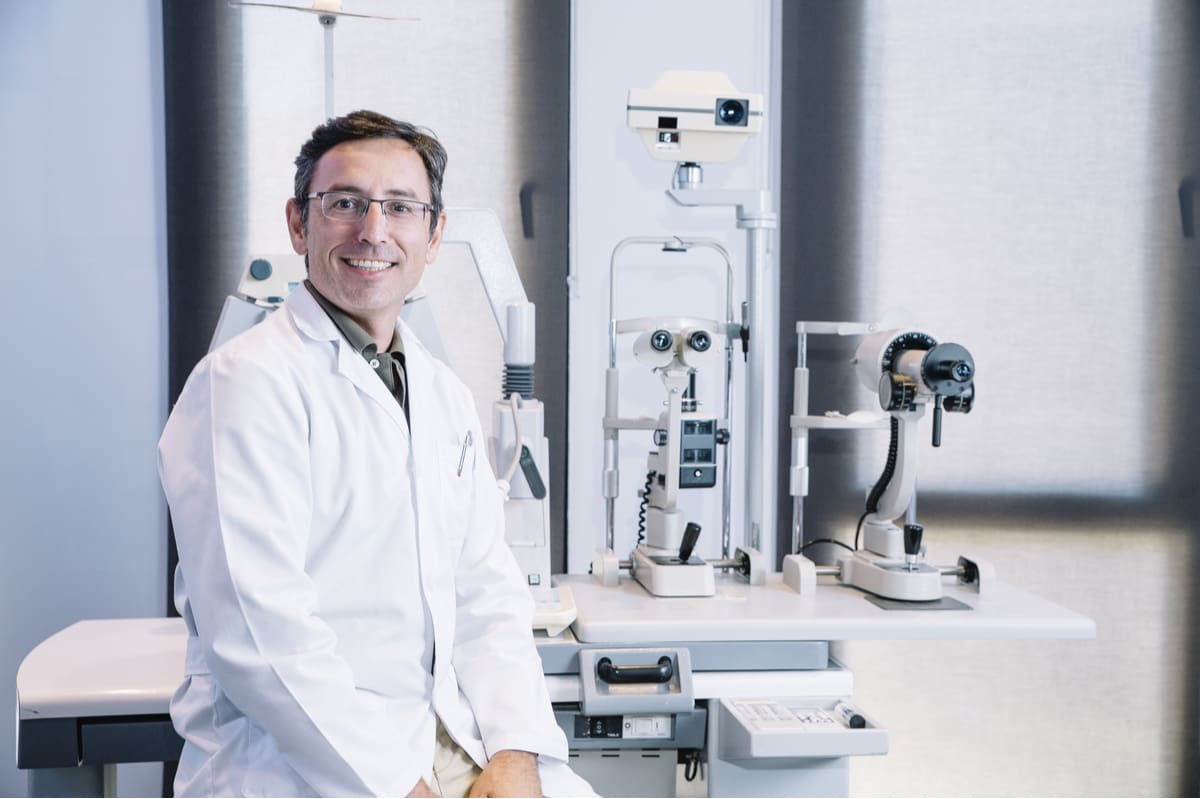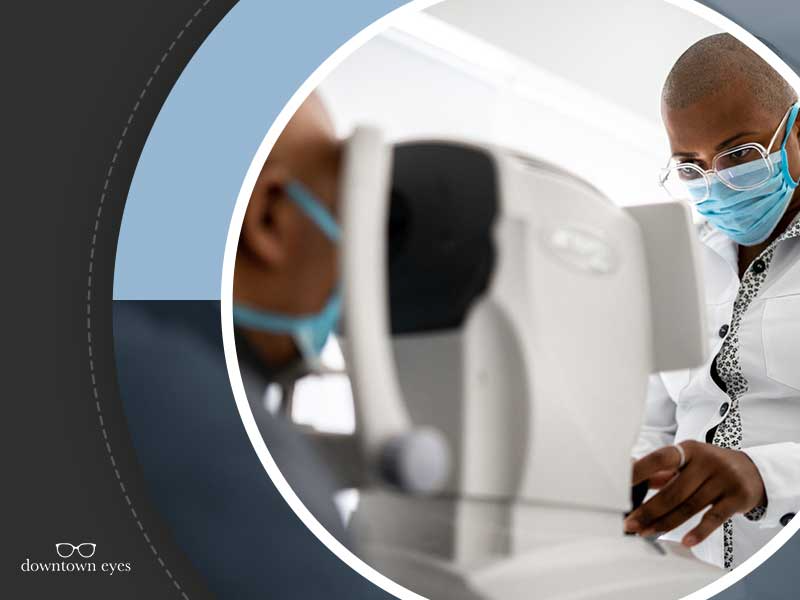Optometrist Montgomery: Quality Eye Treatment and Vision Solutions
Optometrist Montgomery: Quality Eye Treatment and Vision Solutions
Blog Article
The Significance of Regular Eye Examinations: Insights From a Seasoned Optometrist
Normal eye examinations work as an essential element of health care that expands past mere vision improvement. A seasoned optometrist can supply understandings into exactly how these assessments not only identify typical eye problems yet additionally reveal underlying health issues that might otherwise go undetected. The quiet progression of diseases such as glaucoma and macular degeneration emphasizes the requirement of early discovery. Comprehending the regularity and value of these analyses can ultimately influence one's long-lasting health trajectory, increasing the inquiry of just how commonly people ought to prioritize their eye health in the context of total wellness.
Benefits of Regular Eye Examinations
Although many people may overlook the value of regular eye exams, these evaluations play an essential duty in preserving total health and wellness. Regular eye examinations offer not just to analyze vision but additionally to find early signs of systemic health concerns, consisting of diabetes and high blood pressure. By recognizing these problems at their beginning, patients can obtain timely treatments, substantially boosting long-lasting outcomes.
Additionally, eye tests can aid in checking existing health issues, making sure that any kind of adjustments in vision or eye health are quickly resolved (optometrist). The assessments permit for individualized recommendations relating to glasses, way of life modifications, and safety actions against possible eye strain or damage
Beyond physical health and wellness, the benefits of normal eye exams extend to enhancing quality of life. Ultimately, focusing on eye tests cultivates a proactive approach to wellness management, equipping individuals to take fee of their health.
Common Eye Conditions Detected
Routine eye tests are important in detecting a range of typical eye problems that can dramatically impact vision and general health. Among the most prevalent problems recognized throughout these assessments are refractive errors, including nearsightedness (nearsightedness), hyperopia (farsightedness), and astigmatism. These conditions frequently materialize as blurred vision and can be easily remedied with prescription glasses or contact lenses.
In addition, cataracts, which trigger clouding of the lens, are frequently detected in older adults. This condition can lead to lessened vision and requires surgical intervention for resolution. One more typical concern is glaucoma, a group of eye illness that harm the optic nerve, frequently linked to raised intraocular pressure. Early detection is crucial as it can protect against permanent vision loss.
Age-related macular degeneration (AMD) is another substantial condition that affects main vision, especially in individuals over 50. Ultimately, diabetic retinopathy, a complication of diabetic issues, can result in serious vision disability otherwise kept track of on a regular basis. Through detailed eye exams, these conditions can be identified early, enabling timely management and therapy to maintain vision and enhance high quality of life.
Value of Early Discovery
Early discovery of eye conditions plays a crucial role in protecting vision and preventing substantial wellness complications. Many eye conditions, such as glaucoma, diabetic person retinopathy, and age-related macular degeneration, can advance silently without obvious signs and symptoms in their beginning. By the time symptoms materialize, permanent damage might have taken place, resulting in permanent vision loss.
Routine eye tests promote very early medical diagnosis, enabling for timely treatment and treatment. For example, treating elevated intraocular pressure can avoid the beginning of glaucoma, while managing blood sugar level levels can dramatically decrease the threat of diabetic retinopathy. Additionally, conditions like cataracts can be efficiently handled with medical intervention when identified early.

Just How Often Should You See?
Establishing the regularity of eye tests is essential for maintaining optimum eye blog here health and vision. The basic recommendation for grownups is to have a thorough eye test each to 2 years, depending on specific threat elements and age. For individuals matured 18 to 60, a test every two years is commonly sufficient if no vision issues are existing. Nonetheless, those over 60 need to consider yearly examinations, as the risk of age-related conditions raises substantially.
People with certain danger their website factors, such as a household history of eye disease, diabetes mellitus, or existing vision troubles, may need more frequent examinations. Children ought to have their first eye test at six months old, adhered to by additional tests at age three and prior to going into school. Normal examinations during childhood years are critical as vision can change quickly throughout developmental years.
Eventually, the frequency of sees ought to be tailored per individual's circumstances, including way of life, work threats, and any kind of pre-existing eye conditions. Consulting with an eye care expert can give customized referrals, guaranteeing that your eye health is on a regular basis kept an eye on and kept.
Tips for Your Eye Examination
Preparing for your eye exam can improve the performance of the visit and guarantee a thorough examination of your eye wellness. To optimize your time with the eye medical professional, it is important to gather appropriate details before your visit. Start by compiling a list of any type of drugs you are currently taking, including over the counter medicines and supplements, as these can impact eye health.
Additionally, document any symptoms you have actually experienced, such as obscured vision, pain, or migraines. This info will assist your optometrist in detecting prospective issues. If you use glasses or contact lenses, bring them along, also if you don't use them frequently. This will help the physician assess any type of changes in your vision.
It is additionally helpful to have a family history of eye conditions available, as hereditary variables can add to your eye health. Finally, take into consideration scheduling your exam for a time when you are much less hurried, allowing you to ask inquiries and review your problems thoroughly. By preparing properly, you ensure that your eye examination is productive and that your ophthalmologist has all the required information to provide the most effective care possible.

Conclusion
Routine eye examinations play an essential duty in maintaining both vision and general health and wellness. Inevitably, focusing on thorough eye assessments contributes significantly to the preservation of vision and the improvement of high quality of life, underscoring the need of routine eye treatment in preventive healthcare techniques.
Regular eye exams are critical in finding a selection of usual eye problems that can considerably influence vision and general health and wellness.Identifying the regularity of eye tests is eye doctor near me essential for maintaining optimum eye health and wellness and vision.Preparing for your eye exam can boost the efficiency of the see and ensure a thorough analysis of your eye health and wellness (optometrist). By preparing properly, you guarantee that your eye examination is efficient and that your eye medical professional has all the required info to provide the finest care feasible
Eventually, focusing on comprehensive eye evaluations adds dramatically to the preservation of vision and the enhancement of high quality of life, underlining the requirement of routine eye care in precautionary medical care approaches.
Report this page